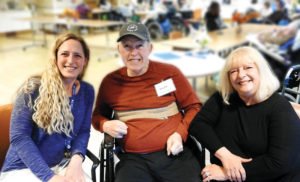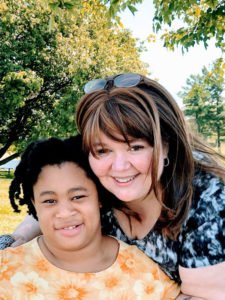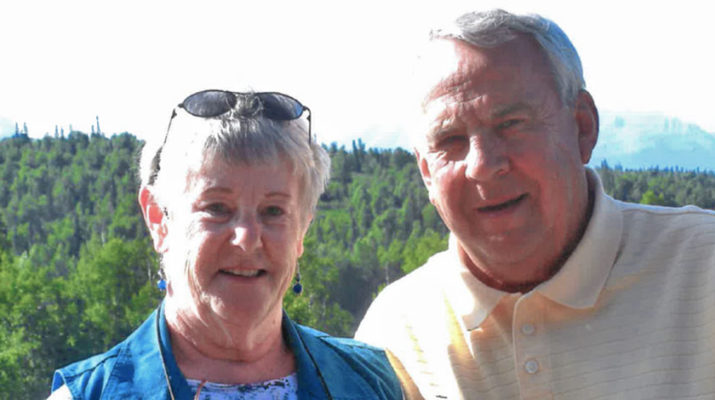November is National Family Caregiver Month. Three CNY women share the stories of their journeys as caregivers
By Mary Beth Roach
November is National Family Caregivers Month, a time dedicated to remembering the millions of family members who tend to the physical and emotional needs of their loved ones.
According to statistics for 2015 provided by the National Alliance for Caregiving and AARP, 34.2 million Americans provided unpaid care to an adult age 50 or older, and 15.7 million Americans care for family members with Alzheimer’s or other forms of dementia.
Three Central New York women recently shared the stories of their journeys as caregivers.
Two women who are caregivers for their husbands and one who is a single mother with a child with a myriad of health needs discussed the challenges that come with that role, the range of emotions, their support systems and their unique perspectives that enable them to carry on.
Parents who are caregivers for children with special needs can also feel isolation and anxiety, constantly waiting for the other shoe to drop, and the stress of the situation can often cause divorce, according to Kate Houck, executive director of David’s Refuge, a local organization established to provide respite weekends for parents.
Barbara Shelly
‘We just did what families do’
Barbara Shelly, 76, has tended to her son before his death from cancer in 1981. She’s been a caregiver for her husband’s aunt, for her sister, for her mother and now her husband, Dan, 78.
“We just did what families do. When you look back on it, you’re like ‘oh my gosh,’ but you don’t think about how you’re going to do it, you just respond,” Barbara said.
Barbara and Dan have been married for 53 years. But when Dan had a stroke the day after Christmas in 2014, while they were at their winter home in Florida, her life as she had known it began to unravel. Dan had suffered what doctors call multi-infarct vascular dementia, which is brought on by a stroke, or mini strokes, that causes a loss of brain function. Dan’s situation was made worse by several other health issues he had.
After returning to Syracuse, Barbara, Dan and their daughter, Robin, began the arduous task of visits with specialists, trips back and forth to the University of Rochester Medical Center for a diagnosis that would allow them to seek further treatment and therapy. The diagnosis of the multi-infarct vascular dementia prompted Barbara and Robin to begin to do a lot of research and talk to people.
“What we decided to do instead of reacting to things was to be proactive,” Barbara said. “Until then we were reacting. Every new thing that comes up, we’d either try it, check it out.” One of their searches led them to the local chapter of the Alzheimer’s Association, which Barbara said, has been very helpful and opened the door to a wealth of resources. She also found great resources through the Onondaga County Department of Adult & Long-Term Care Services.
“While this person is reducing their world, because of their dementia, you have to expand your world to include resources for the person that’s losing their presence in the world,” Barbara noted.
She also tried various programs that she thought Dan might enjoy — and they would work for a while — but life at home became increasingly challenging. Eventually the family decided that the best option for Dan was to move him to a residential care facility. He has since moved into a facility in the eastern suburbs of Syracuse with a specific memory care unit.
Like so many caregivers, her emotions over time have run the gamut — anger, feeling cheated, depression, loneliness. But she has a strong network of people, including her daughter and one of her best friends.
Having been a caregiver for so many of her family members, she has learned some valuable lessons. “When you’re starting to make decisions, you need to be proactive. Being in denial only hurts you and your loved one. So, find a resource for yourself first,” she pointed out.

Donna Rawson
“He’s my husband. I married him for the good and the bad times”
Donna and Ralph Rawson had dreamed of going on an Alaskan cruise when she retired. It is not to be.
Today, at the age of 64, Donna said her dream is to make life as realistic for her husband, age 73, who suffered his third stroke this past January.
Ralph’s first stroke, in 1995, affected his left side; his second, in 2016, impacted his entire right side, including his ability to eat and swallow. The third has affected his peripheral vision.
Ralph’s memory has been compromised to some degree as well, and sometimes he’ll drift back in time, she said.
Each hospitalization was followed by intensive therapy, and although people have suggested to Donna that she place Ralph in a nursing home, she said she couldn’t. She remarked to them that she wasn’t ready to put him there.
“He’s my husband. I married him for the good and the bad times,” she said.
So over time, she learned to puree food, and although he’s progressed to whole foods, she makes sure that everything is cut up to a size he can manage. She gets him up every morning, bathes him, dresses him, checks his blood sugar since he’s on insulin, and then determines what their breakfast will be. They then do some simple stretching exercises.
Ralph is a registrant at the Adult Day Health Center at St. Camillus, and on the three days he goes to that facility, Donna will help out at her parish, Our Lady of Hope in Syracuse, have lunch with a friend, or catch up on her sleep.
On the other days, Donna might take him to Home Depot, the grocery store or the Destiny USA. While helping him in and out of his wheelchair and in and out of the car to take these rides can be physically difficult for Donna, she said that it makes him feel like he’s part of life and not just sitting home.
“I try to keep things as normal as possible,” she said.
For a while, she found herself completely waiting on him, but soon realized, she said, it wasn’t fair to either of them. So now, Ralph helps her with little household chores, like folding the towels, watering the plants or dusting. While these may be small things, the smile on his face when he accomplishes these tasks is so encouraging for her. “He can feel good about doing things,” she said.
Donna realizes that she is fortunate to have a strong support system around her, something critical for caregivers.
Their daughter, Michele Day, and son, Father Matthew Rawson, are in the Syracuse area and visit when they can. She has a cluster of friends who have been a source of strength, too. “If I feel myself getting down, all I have to do is text somebody, and I get an immediate response.” Her parish community and her strong faith have also sustained her.
“I think my faith and my religion have become very strong throughout this. Because if I didn’t have that, I think I would have been lost,” she said.
She gets up each morning about 90 minutes prior to Ralph’s in order to pray to help her through the day, she said.
And while the days and nights can be exhausting — and Donna admitted to feelings of being tired, depressed, and frustrated — there are times when a simple gesture or remark can lift that weight for a bit.
She related one of those moments that she and Ralph shared one evening not too long ago. He had wheeled himself over to Donna and said to her, “‘if it wasn’t for you, I don’t know what I would be or where I would be because I love you so much.’”
Donna said, “I have always loved my husband, and I always will. And I think the strength that I get from my own faith and hope carries me through quite a bit. I’ve learned to care for him, not because I have to, but because I want to.”

Julie Gridley Crosby
‘My daughter’s just taught me we’re all OK. She is so happy. The littlest things make her joyful’
Julie Gridley Crosby’s life is a balancing act.
As a single parent, she is the primary caregiver for her 11-year-old daughter, Addison Gridley, whose myriad of health issues began at birth. Her elderly mother, who has a number of health needs, moved in with them a little over a year ago. Julie holds a full-time job and she says life can get pretty taxing at times.
Addison has cerebral palsy; arthrogryposis multiplex congenita (AMC or often just called arthrogryposis, which consists of joint contractures that affect her from the hips down); brain anomalies; and epilepsy, which has been brought under control with medications. She’s non-verbal and in a wheelchair. Yet, Julie said, her daughter is very bright, curious and engaged.
Addison needs to be transitioned from her bed to her wheelchair, and to the stair gliders in their home. And when she wants to get out of her chair, which Julie said is often, she will crawl around, using her upper body. However, Julie needs to lift her daughter from the chair to the floor and back each time. They even considered looking for any lift chairs available to easily lift Addison.
“She’s a really active kid. She’s really curious. She wants to be doing different things,” she added. But because her legs can get twisted or bent, she needs continual supervision. Julie also needs to assist Addison with dressing and some personal hygiene routines. While she has aides to help her with Addison and her mother, it’s still Julie who takes on the majority of the work — and the emotions and the concerns.
Being a single mom, Julie said, “I have no one to pass the baton to on a regular basis.”
There’s the added concern of what would become of Addison if something were to happen to Julie. Now, at the age of 55, she is planning to take an early retirement in the very near future, leaving SUNY Upstate, where she’s worked for 37 years because she feels she needs to be home.
“I’m having really conflicting feelings about that,” she said. “I’m looking forward to having less to juggle, but at the same time, that’s a loss in and of itself for me.”
When Addison was younger, Julie had family members nearby — a sister and some grown nieces — who could offer some assistance, but over time, they’ve all moved away. She also explained that when she became a mom, her friends were also becoming mothers or already had young children. But there “came a fork in the road,” she said. “They’re living a very different experience than me.”
That feeling of isolation is common for parents of a child with special needs.
She has been able to find emotional support from David’s Refuge, a Manlius-based nonprofit that provide respite, resources and support to parents and guardians of children with special needs or life threatening medical conditions
“I’m very close to people I’ve met through David’s Refuge. Every time I’m with them, I feel strengthened. I get an email or a text or I can reach out and say ‘I’m having a real hard day today,’ and they get it. That support means an awful lot,” Julie said.
As the first single parent in the organization, she would go on to establish a single parent’s group there. She helps to host the respite weekends at different B&Bs in the area, showing them to their rooms and facilitating the group meeting.
Through her experiences, Julie has come to learn a great deal about herself.
“My daughter’s just taught me we’re all OK,” she said. “She is so happy. The littlest things make her joyful. I actually legally changed her middle name to Joy. She’s full of joy. And that’s one of the lessons — to be happy. We’re together. We’re happy. We love each other.”
Photo: Barbara Shelly her husband, Dan. He had a stroke the day after Christmas in 2014, while they were at their winter home in Florida. After that episode, Barbara’s life as she had known it began to unravel. She is her husband’s primary caregiver.

